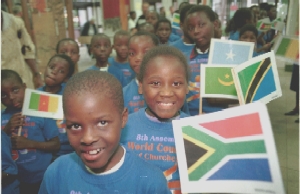By Noel Bruyns
 After a wet
and muddy start to the assembly, participants are beginning to enjoy the real
Africa, as one imagines it from travelogues.
After a wet
and muddy start to the assembly, participants are beginning to enjoy the real
Africa, as one imagines it from travelogues.
The marimba and drum music, traditional dance and infectious happiness of the locals are
still fresh in our minds after last night’s cultural evening.
There are occasional patches of blue African skies during the current rainy season. The
friendliness of the security guards is memorable.
The Africa plenary yesterday afternoon gives another, deeper dimension to the image of
Africa.
Listening to the Rev. Barney Pityana and Dr Mercy Oduyoye, one is struck by an
"other-ness" in African spirituality.
Oduyoye spoke out aloud with no self consciousness to her ancestors, defying those
Christians who shake their head disapprovingly of the ancestor cult they incorrectly call
"pagan ancestor worship".
She spoke of Creator God of Many Names, who her ancestors knew long before the
missionaries came.
This simple spirituality, talking to God and the ancestors accompanying them in their most
down-to-earth human condition, is typically African.
Pityana addressed the misconception by the first European settlers that Africans had no
religion because there were no outward signs of religiosity — no buildings, no holy
places, no postures pointing to the divine, no sacred dress.
For the true African, even the Christian African, Pityana tried to say, these outward
signs are not necessary.
"We have only known God in the people of our everyday experience. ... The entire
activity of the people, their very being was a devotion to the deity who is the creator.
To understand the people of Africa, therefore, requires a paradigm shift about God and
religious life."
The traditional soul of Africa reflects an innate spirituality and holiness. In part its
soul has been pierced by colonialism and missionary connivance, in part by the sinfulness
and complicity of its own people.
Echoing the sentiments of both Oduyoye and Pityana, Canon Clement Janda, general secretary
of the All African Council of Churches, earlier during the assembly warned of glorifying
the growing church in Africa: "Where is the depth of the church? Why is it that in
Rwanda, where 70 per cent or more of the people claim to be Christian, they can’t see
in each other the face of the Christ but only an ethnicity?"
Christians — and others — in Africa need the solidarity of the rest of the world
in "eradicating poverty, establishing democracy, human rights and good systems of
governance and, finally, setting standards for a moral universe".
But Christians in Africa themselves need to recapture and reincarnate the spirit and faith
of the ancestors to give new meaning to their faith in Jesus Christ.
A good starting point — or a point to continue from with greater commitment for those
who have already worked on it — is to develop a theology of "ubuntu".
Ubuntu, as Pityana described it, is "the creed that has held many Africans to the
ideal that affirms one’s humanity as being tied up with the humanity of others."
Or, popularly phrased: I am human because of and through other humans.
Living a theology of ubuntu will help recapture the true spirit of Africa in Africa. It
will also be a precious gift which the church in Africa can offer other churches.



After a wet and muddy start to the assembly, participants are beginning to enjoy the real Africa, as one imagines it from travelogues.
